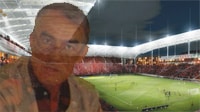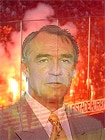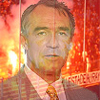 At the heart of the events is the recurring football arena in Nice, which ultimately will not come to fruition in the form of the project devised at the Nice City Hall, triggering both statements and inappropriate behavior following the cancellation of constructing this elusive Grand Stadium which has been central to numerous conversations from the corridors of local institutions to the bars of Nice’s cafes.
At the heart of the events is the recurring football arena in Nice, which ultimately will not come to fruition in the form of the project devised at the Nice City Hall, triggering both statements and inappropriate behavior following the cancellation of constructing this elusive Grand Stadium which has been central to numerous conversations from the corridors of local institutions to the bars of Nice’s cafes.
Threatened with reprisals if he showed up at the stadium, vilified by part of the OGC Nice staff, and nicknamed “white knight” by some political colleagues, Jean-François Knecht certainly has reasons to question his local political future, and it is to discuss all this that Nice Première met with the General Councilor of Alpes Maritimes upon his return from Lebanon.
Nice Première: Jean-François Knecht, how did you perceive this motion unanimously voted by the General Council?

This motion could logically have been proposed to the Nice City Council. Disagreements may exist on issues, but fundamental principles should unite people. The municipal majority in Nice clearly defends different values…
NP: After the turmoil of recent days, what is your position on past events?
JFK: If this turmoil can stop the insults and unacceptable behavior, I would be personally satisfied. We must know when to say stop!
Important deadlines are approaching. If threats and pressures are already flying over local issues, what can we expect? I refuse the policy of the worst-case scenario. It’s a scenario, a downward spiral I do not accept and cannot let unfold without speaking up.
It seems to me that an elected official must denounce pressure. Even if it’s not always easy, he has the duty to react. If he throws in the towel and lets such serious things pass by, then what credible arguments could we put forward so that our citizens, who themselves face aggression or threats, do not succumb to fear and fearlessly report to the police station?
NP: What attacks and behaviors have marked you the most?
JFK: It’s the irresponsibility of a senior OGCN official and the cowardice of the individuals making the threats. Hidden behind a computer screen, under the anonymity of a “pseudo,” some individuals dare to threaten your life, your privacy, and cast a discredit on your actions as an elected official.
NP: What would you say to close the debate on the positioning of socialist elected officials in this affair?
JFK: Should we respond to the threats? Yes!
How should it be done? Publicly or more discreetly, in a targeted manner? The question of how much publicity should be given to acts is central in political action. It is on this point that differences could have appeared in the position of socialist elected officials. The explanations having taken place, the matter is indeed closed.
NP: Have you thought about your political future?
JFK: Personally, I do not pursue a career plan. I received the trust of the voters to carry out my mandates as a Municipal Councilor of Nice and General Counselor of Alpes-Maritimes. I strive to fulfill this mission with seriousness and dignity.
If I project myself into the future, it is to express the wish to one day see the city of Nice shift to the left as Paris and Lyon have already done. This is what I am working on, regardless of my political future.
NP: Finally, what are Jean-François Knecht’s projects in Nice?
JFK: To do work in my house and, just as importantly for me, to encourage citizens, particularly young people, to register on the electoral rolls before December 31st.


